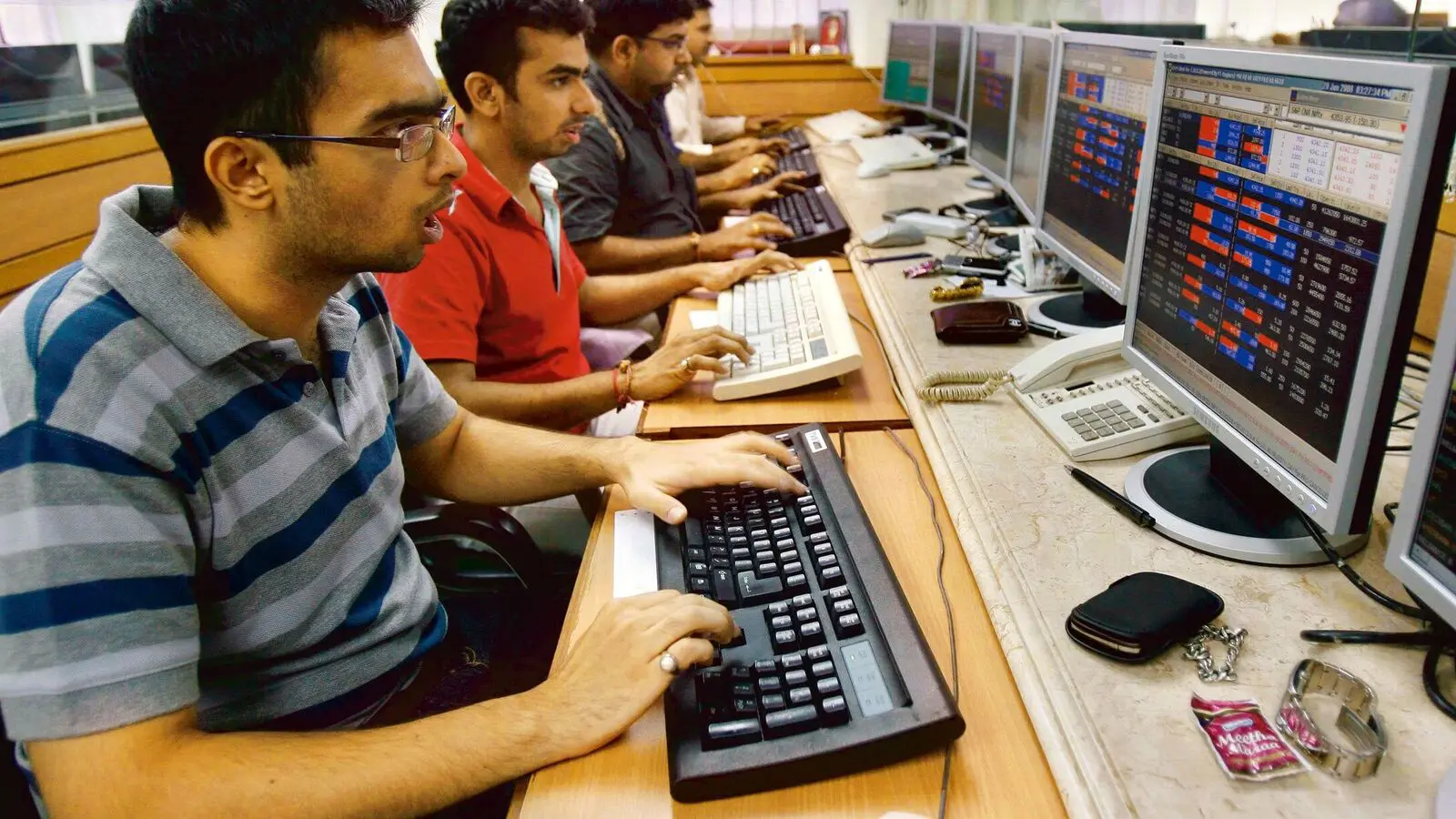New Delhi: The Indian stock market faced significant pressure as both benchmark indices reported steep losses due to escalating concerns over higher U.S. tariffs. The Nifty 50 dropped by 0.85% to 24,509 points, while the S&P BSE Sensex fell by 0.87% to 80,080 points. A wide array of sectors experienced declines, accentuating worries regarding the impact of 50% tariffs on Indian goods. Prime Minister Narendra Modi vowed to navigate through the challenges posed by these tariffs affecting nearly 70% of Indian exports.
Market Reaction to U.S. Tariffs
In a day marked by significant turmoil, Indian stock markets closed sharply lower amidst rising worries that the imposition of hefty U.S. tariffs could jeopardize the Indian economy. The Nifty 50 index fell 0.85%, breaking its crucial support level, while the S&P BSE Sensex experienced a comparable decline of 0.87%. Additionally, the broader markets saw pronounced losses, with indices like the Nifty Midcap 100 and Nifty Smallcap 100 both plunging over 1.3%.
Almost all major sectoral indices succumbed to the selling pressure, with the Nifty IT and Nifty Realty sectors being among the hardest hit, falling by 1.60% and 1.50%, respectively. This downward trend signals to investors and analysts alike that the Indian economy could face substantial headwinds as businesses brace for the tariff impact.
The Implications of 50% Tariffs
The U.S. Customs and Border Protection recently enforced the sweeping 50% tariffs on a range of Indian goods, stating that these measures are part of President Trump’s Executive Order aimed at addressing perceived threats from Russia. Trump has labeled India as a “tariff king,” critiquing the trade deficit and India’s ongoing purchases of Russian military equipment and oil. This punitive measure, effective immediately, impacts about $45 billion worth of major Indian exports, further increasing the sense of urgency among policymakers.
According to analyses by ICRIER, approximately 70% of India’s exports, which are valued at approximately USD 60.85 billion, are now at risk due to these elevated duties. As highlighted by SBI Research economists, the long-term ramifications on the Indian economy could be dire. The sectors most vulnerable include textiles and gems and jewelry—both critical components of India’s export economy, particularly due to their reliance on labor-intensive processes.
Stocks Affected by Market Conditions
The unfavorable market sentiment has translated into significant losses for various stocks. Among the leading losers was Adani Total Gas, which plummeted 7.2% to ₹589 after being removed from the Futures and Options segment, rendering it available only in the cash market. Other notable declines included Aditya Birla Fashion down 5.7%, and Poonawalla Fincorp and Olectra Greentech losing 5.6% and 5.5%, respectively.
InterGlobe Aviation, which operates IndiGo, saw its shares dip by 5.2% to ₹5,734 following a significant block deal of 1.2 crore shares sold by the Rakesh Gangwal family. Just months ago, Gangwal began a gradual exit from the company, causing further concern among investors.
Bright Spots Amidst Market Sell-Off
Despite the pervasive sell-off, not all stocks followed the downward trend. Vardhman Textiles emerged as a surprising performer, gaining 13% to reach ₹450. Similarly, Ola Electric continued its rally, achieving an 8% rise to ₹54.8, making its stock one of the notable gainers amidst widespread market declines. This resurgence can be attributed to bullish sentiments after company announcements outlining ambitious growth plans, aiming to capture 25–30% of India’s two-wheeler electric vehicle market.
Additionally, Sundram Fasteners experienced a 5.1% uptick to ₹1,020. With indications of more companies potentially adapting to the economic landscape, these performances may offer a glimmer of hope in an otherwise challenging environment.
The Path Forward for India
As the market navigates through turbulent waters, Prime Minister Narendra Modi has assured stakeholders that his government will find ways to mitigate the financial pressures stemming from U.S. tariffs. The emphasis remains on maintaining trade relations and ensuring that economic growth does not stall. While expert analyses indicate that the Indian economy may face heightened challenges, the resilience demonstrated by certain sectors highlights the adaptability of Indian businesses in times of uncertainty.
All eyes are now on how the RBI will respond to these developments and influence the repo rate, as monetary policy becomes increasingly crucial to bolster the banking sector in light of the impending economic changes. Investors are advised to stay alert and consult financial experts while navigating this volatile market landscape.
Disclaimer: This story is for educational purposes only. The views and recommendations made above are those of individual analysts or broking companies, and not of Mint. We advise investors to check with certified experts before making any investment decisions.
Bankerpedia’s Insight💡
The imposition of 50% tariffs on Indian goods by the US significantly impacts India’s banking and finance sector, as it jeopardizes a major portion of India’s exports, particularly in vulnerable sectors like textiles and gems. This looming economic pressure could diminish investor confidence and slow down growth. For readers, it’s crucial to stay informed about market trends and consider diversifying investments to mitigate risk during tumultuous economic shifts. Monitoring government responses and global trade dynamics will be key in navigating these challenging times.
What Does This Mean for Me?🤔
- Salaried Person → Increased tariffs may lead to job instability and reduced income.
- Business Owner → Increased tariffs threaten profit margins and export viability.
- Student → Economic instability may affect future job opportunities for students.
- Self-employed → Increased tariffs may reduce self-employed income and sales.
- Homemaker → Higher tariffs could increase household expenses for essentials.
- Retiree / Senior Citizen → Increased economic uncertainty may reduce retirement savings stability.
- Job Seeker → Job market uncertainty increases; fewer opportunities may arise.
- Farmer / Rural Citizen → Higher tariffs reduce income and market access for farmers.
Research References📚
📲 Stay ahead in banking & finance!
Join the Bankerpedia WhatsApp Channel for instant updates, and
subscribe to our YouTube Channel for in-depth analysis and expert explainers.










